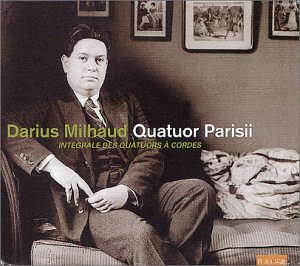Darius Milhaud (1892-1974)
has suffered (as did Martinů) from his fecundity. Milhaud played
chamber music in his childhood and valued the economy and austerity
of the string quartet genre as 'an intellectual discipline and crucible
for the most intense emotions'. He began with Op.5 (1912) and
by 1920 had determined to compose eighteen string quartets (one more
than Beethoven)! Having achieved that goal after a couple more decades
with Op.308 (1942), he paused but could not quite stop, and so, to complete
a uniquely revealing and rewarding collection, here are included a short
In memoriam Igor Stravinsky (1971) and three Etudes sur des
thèmes liturgiques du Comtat venaissin (1973).
This intégrale cycle of 18 string quartets
(the French are particularly keen on those) displays to the full Milhaud's
melodic gifts and sheer ingenuity in his command of polytonality, which
he made his own, notably in a bonus Octet Op 291 (quartets 14 and 15
played simultaneously!). I remember vividly his conducting it at the
Royal College of Music with two student quartets who had first played
one each. It would have been a nice gesture to have entrusted the Quatuor
Manfred with one of them here, which appears not to have been the
case?
Another very different quartet, which is far from Milhaud's
more usual breezy, optimistic manner in the outer movements, is No.
3, an in memoriam for a close friend, two slow movements ending
with a passage from his journal (you can follow the text in French and
English if you fold in half two pages in between) sung by Véronique
Dietschy, soprano, a notable singer whom I remember admiring in
her UK debut long ago at the Institut Française in London, and
subsequently on a special Accord CD of Debussy songs since when, so
I discover from surfing the web, she has made a substantial career in
France, though I had not come across her again in UK. The inclusion
of a voice and the later double quartet (octet) put me in mind of my
recent thoughts about string octets
(should they be conducted?) and quartets-with-voice
(Schafer and Volans) published in Seen & Heard.
The Quatuor
Parisii was founded in 1981 by four Paris Conservatoire students,
who played No 4 in 1984 and promised Milhaud's widow Madeleine then
that they would record all eighteen. They went on to win many prestigious
competitions, remained together and completed this project last year.
The performances are as good as you could reasonably expect (a few moments
show a little strain) and are well recorded. It is a labour of love
by all concerned for this amiable composer (his My happy life - Darius
Milhaud, Ma vie heureuse, Paris 1973 - is a joy to read) and the
detailed descriptive notes on each quartet (Jean-Louis Leleu and Jeremy
Drake) take you through their rigorous construction and have many quotes
from his adored wife and widow, Madeleine Milhaud. I wondered whether
initial doubts about the enterprise, as well as artistic considerations,
prompted the decision to arrange the CDs non-chronologically, but this
is no great problem; indeed I would recommend playing them one at a
time and they suit well my approach to daunting boxes of the complete
this and that, which is to play one each morning at breakfast!
It is odd that the Milhaud quartets have almost disappeared
from the UK chamber music repertoire, as I am sure they would give pleasure
at, say, the morning lunch-time recitals at Wigmore Hall and Blackheath.
It is perhaps churlish also to note the absence of proof-checking and
lack of simple typographical aids to highlight individual works (their
ordering does not correspond with that on the CDs) and generally to
make the comprehensive notes more reader-friendly. There are good illustrations
in the booklets, with photos of Milhaud at different ages, and full
details (plus sound bites of each movement if you have the right equipment)
at http://www.quatuorparisii.net/discographie/Milhaud/milhaud.html.
At an amazing under £13 from Amazon for 5 CDs in a
slip case (well, £12.99 actually!) this must be a bargain to be snapped
up gratefully.
Peter Grahame Woolf
NOTE: check the price carefully. I searched Amazon.co.uk
on 4 August 2002 and found it listed at £40.00


